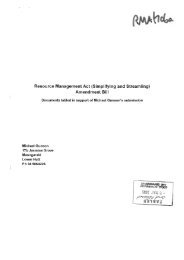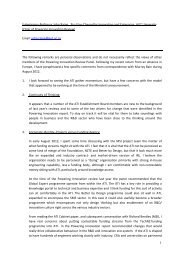Parliamentary Debates (Hansard) - New Zealand Parliament
Parliamentary Debates (Hansard) - New Zealand Parliament
Parliamentary Debates (Hansard) - New Zealand Parliament
Create successful ePaper yourself
Turn your PDF publications into a flip-book with our unique Google optimized e-Paper software.
16 May 2009 Local Government (Auckland Council) Bill 3757<br />
the time referred to in footnote 22 on page 175 of McGee. He was the Speaker<br />
responsible. It is very, very clear that once a member sits down after moving a motion,<br />
the member’s right to speak has ended. Of course, once a member’s right to speak has<br />
ended, his or her right to move anything is forfeit, as well. Other than by way of leave<br />
of the House or a motion of the House, the member cannot recover the right to speak. If<br />
the member cannot speak, of course, the member cannot move a motion in the House.<br />
Hon RODNEY HIDE (Minister of Local Government): I thank the Hon Trevor<br />
Mallard for drawing our attention to what is set out in McGee, but I draw his attention<br />
to the fact that if he reads the entire paragraph that he is referring to and the one<br />
preceding it, he will see that they are talking about making a speech rather than moving<br />
a motion. Trevor Mallard is saying that once a member has sat down after moving a<br />
motion, that member does not have a right to give a speech. That is not what we are<br />
dealing with here; it is something different. I was not asking to give another speech on<br />
the motion; I just wanted the motion to be put properly.<br />
Hon TREVOR MALLARD (Labour—Hutt South): I want to make the point<br />
absolutely clear, Mr Assistant Speaker, just while you are finally looking at the matter. I<br />
remind members that it is a longstanding convention in this House that unless one can<br />
have the call, unless one has the right to speak, one cannot move a motion. There is no<br />
ability to move something in this House—or, in fact, as far as I am concerned, in any<br />
<strong>Parliament</strong> of the Westminster system—unless one has the call to speak. People get the<br />
call in different ways in different debates, but it is very, very clear and it is something<br />
that I think is quite important; otherwise, democracy could be trampled on relatively<br />
easily. If a member cannot be on his or her feet to speak—and the Minister could not<br />
be—then that member cannot correctly move a motion of that sort.<br />
Hon RODNEY HIDE (Minister of Local Government): I will make a final, quick<br />
statement. I clearly had a right to be on my feet, because I had the authority of the<br />
Speaker—Mr Assistant Speaker Barker. You specifically asked me and invited me to<br />
get to my feet. I actually did have the right to finish the motion, because you, Mr<br />
Assistant Speaker, had invited me to do so.<br />
The ASSISTANT SPEAKER (Hon Rick Barker): I have heard a considerable<br />
amount of discussion. Firstly, I think the issue about whether the member who was<br />
speaking had the right to speak is not particularly material to this point. What I think is<br />
material to this point is Standing Order 279, which states: “(1) The member moving the<br />
bill’s first reading must indicate in that member’s speech to which select committee it is<br />
proposed to refer the bill and whether it is proposed to move for any special powers or<br />
give an instruction in respect of the committee’s consideration of the bill. (2) Following<br />
the member’s speech, written notice of any special powers or instruction to be moved<br />
must be delivered to the Clerk at the Table.” This requirement is a protection for the<br />
House to ensure that at the time the Minister moves a motion and special directions, the<br />
House knows precisely what the Minister intends to do some time later, protecting<br />
members from ambush or unnecessary changes.<br />
I have in my possession the notice supplied by the Hon Rodney Hide to the Clerk of<br />
the House saying: “Consistent with the Standing Orders, I move that the Local<br />
Government (Auckland Council) Bill be considered by the Auckland Governance<br />
Legislation Committee … and that the committee report finally to the House on or<br />
before 4 September 2009.” That is the notice that the Hon Rodney Hide gave to the<br />
House. Having made that statement to the House in the first reading, and having given<br />
this notice to the Clerk, the member is then obligated to ensure that that is the motion<br />
that is read. That is the requirement on the member. The Clerk identified that the<br />
member had changed his motion by omitting something, and there is an obligation on






![Full evidence text [PDF 8908k] - New Zealand Parliament](https://img.yumpu.com/14025494/1/184x260/full-evidence-text-pdf-8908k-new-zealand-parliament.jpg?quality=85)
![−3 JUN 2009 IRELEASED] - New Zealand Parliament](https://img.yumpu.com/12829724/1/185x260/3-jun-2009-ireleased-new-zealand-parliament.jpg?quality=85)
![Full paper text [PDF 3515k] - New Zealand Parliament](https://img.yumpu.com/11267192/1/184x260/full-paper-text-pdf-3515k-new-zealand-parliament.jpg?quality=85)


![Full evidence text [PDF 9k] - Parliament](https://img.yumpu.com/7938085/1/184x260/full-evidence-text-pdf-9k-parliament.jpg?quality=85)





